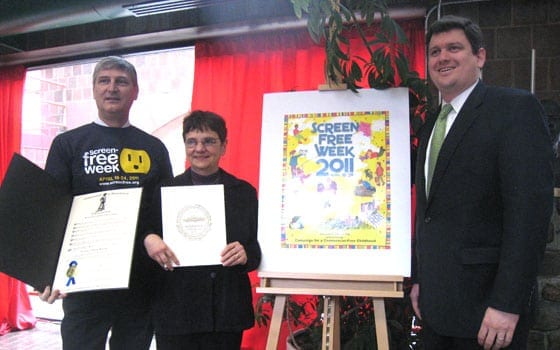
The Campaign for a Commercial-Free Childhood (CCFC), a Boston-based organization known for its efforts to fight child-targeted marketing, is kicking off a nationwide call to families to turn off screens — TVs, DVDs, computers, iPhones — for the week of April 18-24.
At a March 31 press conference sponsored by United South End Settlements (USES), CCFC Co-founder and Director Susan Linn enumerated some of the negative effects of too much “screen time” on developing minds and bodies.
“Screens and the commercialism they bring are factors in childhood obesity, eating disorders, the sexualization and objectification of young girls, youth violence, family stress and the false notion that the things we buy will make us happy,” she said.
The American Academy of Pediatrics recommends no screen time at all for children under 2 years of age, and no more than two hours a day for older children.
But a CCFC fact sheet indicates that 40 percent of 3-month-old infants are regular viewers of screen media and 19 percent of babies age 1 and under have a television in their bedroom. On average, children see nearly 25,000 television commercials in their preschool years, CCFC says — and that doesn’t even include “product placement,” where brand-name products are featured in the storylines of programs and cartoons.
“If you take one message out of here,” Linn said, “it’s to tell parents they are not helping — and may be harming — their children by putting them in front of screens.”
That said, Screen-Free Week isn’t just about turning screens off; it is meant to be a springboard for engaging in other activities. “Enjoy each other,” she urged. “Sing, play, dance, bake. Go outside. Create something from nothing.”
Linn thanked Gov. Patrick, Mayor Menino and the Boston City Council for officially endorsing the Screen-Free Week campaign. Press conference attendees included City Councilor-at-Large John Connolly and representatives from the offices of state Sen. Sonia Chang-Diaz and city councilors Tito Jackson, Ayanna Pressley and Stephen Murphy.
Connolly, who with Pressley co-sponsored the City Council resolution to endorse Screen-Free Week in Boston, spoke humbly about his own experience as father to two children, a 3-year-old and a 19-month-old.
One of the things he said he was “clueless” about as a new parent was the importance of language acquisition, long before children are old enough to talk or read.
“Parents need to talk to their children, in the womb and when they’re a day old,” he said.
“We have a society that has put television and video games and computers and iPads at the center of our lives,” said Connolly. “But we’re setting up our children to fail over the long haul.”
Connolly cited health and academic achievement disparities between whites and minorities in Boston and other cities.
“Children living in poverty and children of color, will face health issues at far greater rates than their more affluent and white counterparts,” he said, as he explained the link between screen time and childhood obesity rates.
As for academic achievement, Connolly said, “When you’re watching TV, you’re not acquiring language … If you don’t get that early literacy piece in place, the challenge to succeed academically becomes mountainous.”
Linn reminded the audience that CCFC is the organization that successfully pressured Walt Disney Company and other companies in 2007 to stop labeling their baby-targeted videos as “educational.” In a further step, CCFC engaged lawyers who persuaded Disney to offer full refunds to anyone who had purchased videos in the “Baby Einstein” series since 2004.
“There is no evidence at all that babies learn anything meaningful from television and screens,” Linn said. “There is some evidence they may be harmful. And there’s clear evidence that watching TV or using a “phone app” is not an effective means of teaching language to children.”
Kevin Hepner, president of USES and a member of CCFC’s national steering committee, said USES is serving as a hub of communication about Screen-Free Week, disseminating information to the 200 families whose children participate in its daycare, preschool and afterschool programs. The agency will also incorporate the screen-free theme into vacation week camp activities, as Screen-Free Week coincides with the April vacation week for Boston Public Schools.
For more information on CCFC and Screen-Free Week activities, visit www.commercialfreechildhood.org.


![Banner [Virtual] Art Gallery](https://baystatebanner.com/wp-content/uploads/2024/04/Cagen-Luse_Men-at-store-e1713991226112-150x150.jpg)



